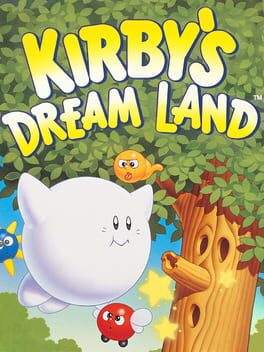There's really no getting around how short Kirby's first outing is. Five very brief levels with relatively straightforward boss fights and the end of each, which you then fight again before challenging the final boss, who himself has only about three attack patterns you dodge around and then attack back during. Kirby's Dreamland is a criminally simple game, and as much as that is a detriment to its enduring quality it's also perhaps it's greatest strength. There's great value in a game you can complete in just a single sitting; a couple hours for a complete experience from start to end. Kirby's Dreamland is even less than that, being completely beatable in less than an hour. There is an extra mode with additional and more difficult enemies sprinkled across the levels after you've finished, but even both together will take up the better half of an afternoon at best. That may be a little too short ultimately, even for a bite-sized Gameboy game, but it still feels like a complete, breezy experience.
The qualities for which Kirby is still admired as a series are notably present in this initial entry. Kirby's mission statement is one of relative ease and pleasant designs. The lack of a timer and Kirby's infinite mobility are nominal departures for platformers of this period, removing pressure and considerable challenge for the player to approach the game with a more relaxed mentality. This gels with the noticeable lack of copy abilities Kirby possesses here, a key innovation for the series which wouldn't come until the second game. While some bemoan the lack of this core dynamic of the Kirby series here, the design of the game is very much considered around the limited capabilities of the beloved pink (or grey) blob.
Aside from its historical significance as Kirby's first game, it's hard to say why many should even come back to Kirby's Dreamland today. For me, the quick completion and lack of powers are distinguishing enough qualities to find it worth playing through every now and again between other activities. But clearly, these are not universal qualities, and there are undeniably many other games in the series which provide a similar satisfaction with more to digest, and without ballooning the ease of completion in the process. There's not much else to say other than I really enjoy the no-frills simplicity of Kirby's Dreamland, clearly carving out a unique platformer identity and a strong, if short, baseline to build of off in the near future. The basic, almost borderline forgettable, level design of the game's five brief stages I can see being a boon for the next time I want to crank out a quick playthrough, actually. At least then, the experience won't feel so familiar as to make it not worthwhile to go through again.
The qualities for which Kirby is still admired as a series are notably present in this initial entry. Kirby's mission statement is one of relative ease and pleasant designs. The lack of a timer and Kirby's infinite mobility are nominal departures for platformers of this period, removing pressure and considerable challenge for the player to approach the game with a more relaxed mentality. This gels with the noticeable lack of copy abilities Kirby possesses here, a key innovation for the series which wouldn't come until the second game. While some bemoan the lack of this core dynamic of the Kirby series here, the design of the game is very much considered around the limited capabilities of the beloved pink (or grey) blob.
Aside from its historical significance as Kirby's first game, it's hard to say why many should even come back to Kirby's Dreamland today. For me, the quick completion and lack of powers are distinguishing enough qualities to find it worth playing through every now and again between other activities. But clearly, these are not universal qualities, and there are undeniably many other games in the series which provide a similar satisfaction with more to digest, and without ballooning the ease of completion in the process. There's not much else to say other than I really enjoy the no-frills simplicity of Kirby's Dreamland, clearly carving out a unique platformer identity and a strong, if short, baseline to build of off in the near future. The basic, almost borderline forgettable, level design of the game's five brief stages I can see being a boon for the next time I want to crank out a quick playthrough, actually. At least then, the experience won't feel so familiar as to make it not worthwhile to go through again.
